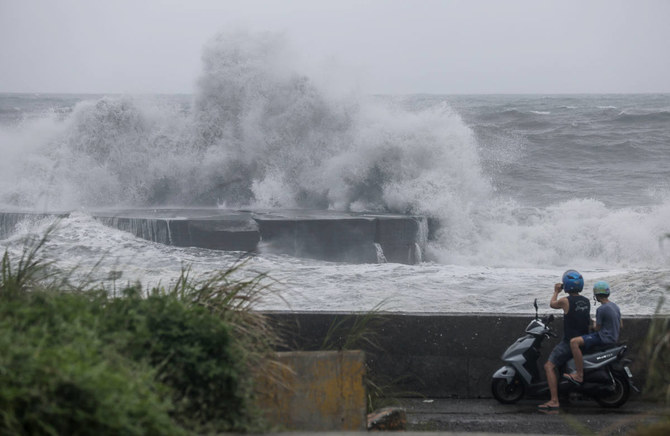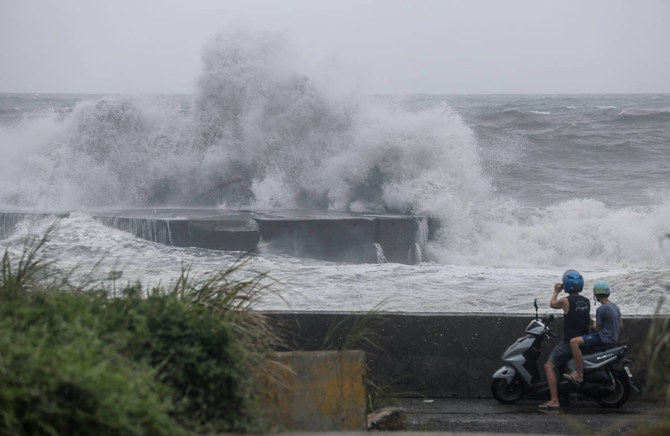TAITUNG: Typhoon Haikui made landfall in eastern Taiwan Sunday, unleashing torrential downpours, whipping up winds and plunging thousands of households into darkness as the first major storm to hit the island directly in four years.

A woman struggles with her umbrella against gusts of wind generated by Typhoon Haikui in Taipei, Taiwan, Sunday, Sept. 3, 2023. (AP)
Nearly 4,000 people were evacuated from high-risk areas, hundreds of flights canceled and businesses closed in preparation for the storm.
Taiwan’s Central Weather Bureau said in a news conference the typhoon was “at our doorstep” and by 3:40 p.m. confirmed to AFP it had made landfall in coastal Taitung, a mountainous county in lesser-populated eastern Taiwan.
Residents hunkered down indoors in the dark, staying away from windows as strong gusts of wind sent fallen trees and dislodged water tanks flying in the air, according to an AFP reporter.
“I think this time it is serious,” said retired mechanic Chang Jhi-ming, 58, in Taitung.
FASTFACT
Nearly 4,000 people were evacuated from high-risk areas, hundreds of flights canceled and businesses closed in preparation for the storm.
“This is just beginning, the wind is just coming in and you can see trees toppling already.”
The typhoon has gathered speed since yesterday, and at 7:15 p.m. was carrying sustained winds of about 140 kilometers per hour.
“Rain and wind will be most intense and its impact will be most obvious during this period” after landfall, said a spokesperson with the weather bureau, adding that the typhoon will move into the Taiwan Strait by Monday evening.
Across the island, more than 21,000 households lost power and, while most saw it restored by mid-afternoon, about 9,000 were still without electricity when Haikui hit — including in Taitung.
Authorities have reported two minor injuries in Hualien county, a mountainous region where a warning for flash floods was issued, after a fallen tree hit a car.
Hualien and Taitung counties were also under a torrential rainfall advisory, due to remain in place until at least Monday afternoon.
The last major storm to hit Taiwan was Typhoon Bailu in 2019, which killed one person.
Taiwanese President Tsai Ing-wen said Haikui would be the first in four years to cross the Central Mountain Range running north to south of the island — a path that could lead to landslides in surrounding counties.
“I remind the people to make preparations for the typhoon and watch out for your safety, avoid going out or any dangerous activities,” Tsai said.
The streets in Hualien were deserted Sunday, battered by unrelenting rain, while a fishing harbor in northeastern coastal Yilan county saw towering waves slam against the shore.
In Yilan, some residents braved the downpour to shop at a nighttime market that had remained open despite the authorities’ warnings.
In Taitung, ripped-up trees already littered the streets before Haikui landed, street signs swayed under the strong winds and a restaurant owner tied down his signpost advertising seafood.
The military had mobilized soldiers and equipment, such as amphibious vehicles and inflatable rubber boats, around the parts of Taiwan where Haikui was expected to have the heaviest impact.
















